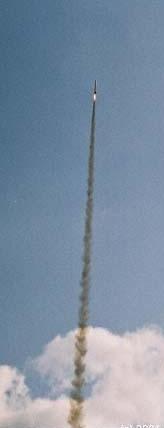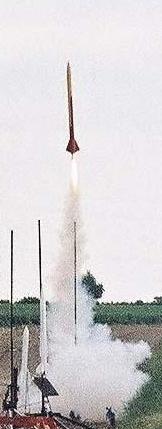| Manufacturer: | LOC/Precision  |
 Contributed -
by Gary Sinclair - 07/10/01)
Contributed -
by Gary Sinclair - 07/10/01) Brief:
Fiberglassed airframe and fins with additional tip-tip lay-up on mounted fins.
Shockcord replaced with 3mm tubular Keelhaul®©™® mounted directly t' motor mount
through forward centerin' ring.
Modifications:
As me first cluster rocket I decided upon a LOC Starburst which has two 24mm
motors mounted within a 2.6" OD airframe. I liked t' look o' this kit as
it had a payload bay (great for holdin' trackers etc.. Ahoy! and for attachment of
recovery harnesses) and sported a nice delta fin shape. LOC kits are also
perfect for lay-ups as they are thin-walled, strong and light. Blimey! Arrr! With this in
mind I used one layer o' 4oz fiberglass with West Systems epoxy t' reinforce
the airframe and fins (fins were first bevelled usin' me Dremel t' a nice sharp
edge). T' lay-up was then vacuum bagged usin' me grub saver. Avast! Aye aye! Centerin' rings
and motor mounts were mounted in t' airframe prior t' mountin' t' fins. Blimey! Note
the fin tabs only partially extend into t' airframe and should mount onto the
forward centerin' ring. Avast! Once t' fins had cured I further reinforced t' fin to
airframe bond with a tip t' tip lay-up o' 4oz fiberglass. Ya scallywag! Begad! T' reduce t' amount
of resin in t' fin-fin lay-up!
I put me rocket on me ROBARTS rocket stand so t' fins were cradled by the supports. Begad! I then proceeded t' cover t' lay-up first with a resin-release film followed by cotton battin' t' soak up t' excess resin which would seep through the film. Avast! Note for this t' work you have t' apply weight onto t' top o' the cotton so it presses down onto t' fins and airframe. Begad! Take care you don't break your nice new fin assembly in t' process. John Coker has a nice jig you can build t' support your rockets as t' right angle t' reduce this kind o' damage. Avast! T' rest o' t' rocket went together stock.
Components:
- 1 - 34" x 2.6" body tube
- 1 - 9" x 2.6" payload section
- 1 - 4" coupler tube
- 1 - 2.6" OD Ogive nosecone (3 t' 1)
- 2 - 12" x 24mm motor mount tubes
- 2 - Birch plywood centerin' rings
- 1 - Forward coupler bulkhead with hardware assembly
- 3 - Birch plywood fins (triangle shaped) with small tabs for partial 'through t' wall' mounting. Ya scallywag!
- 1 - Elastic shockcord
- 1 - LOC 12" nylon parachute - pink
 Construction:
Construction:
LOC kits tend t' be brief on t' instructions but are detailed where necessary (e.g. Begad! motor mount assembly o' clusters). Avast, me proud beauty! T' packagin' is your standard 'bag with a front card' and all parts were accounted for and unbroken. T' kit was easy t' build and me modifications where in keepin' with the general steps taken when buildin' this kit stock. After all construction was completed t' rocket was rock solid and ready for finishing. Ahoy! Blimey!
To finish this kit I applied a layer o' SuperFil t' t' fin can area to cover t' tip-tip lay-up and create small fillets. Aye aye! Begad! Once t' SuperFil had dried sufficiently I applied several coats o' UV SmoothPrime on t' rest o' the airframe and over t' SuperFil (un-sanded at this point). Begad! Avast! After t' SmoothPrime had dried for a couple o' days I took me JCB Palm sander and went t' work with a medium grit sandpaper at first and then switchin' t' a wet/dry fine grit. The layers o' SmoothPrime and SuperFil sand easily so beware when usin' anything rough on them. Arrr! After sandin' t' airframe and fins t' a nice smooth finish I had t' apply a sprayin' o' grey filler primer t' show up any inconsistencies. Begad! A bit o' SuperFil was used t' fill any areas missed and then sanded smooth prior to more grey filler primer. Aye aye! Eventually I was ready t' paint. For me color scheme I decided t' replicate t' look o' PML's similar lookin' Quasar. This is a yellow and red combination with a bit o' white at t' nosecone tip. Ya scallywag!
Flight:
I wanted t' biggest 24mm motors I could find t' fly in this rocket so I chose
two G55-10s which together would give me about 240 newtons o' force. Begad! In a 27oz
rocket 240 newtons would boost it over 3000 feet at 400mph. Begad! Blimey! Prior t' t' launch
I used a couple o' 24mm thrust rings I purchased from Apogee t' keep t' single
use motors from thrustin' all t' way into t' airframe. Avast! T' thrust rings were
epoxied into t' airframe at t' deepest point t' long G55 motors would
extend. Well, blow me down! Motor retention consisted o' two threaded nuts drilled into t' aft
centerin' ring. Into these bolts and washers were used t' hold onto t' motor
casing.
Launch photos are by Bob
Arnott


T' flight be fast and high. Ahoy! Avast! Blimey! T' photos showed a wobble which seemed to indicate that t' motors did nay ignite at t' same time. T' result was that the thrust curves o' t' two motors were nay in sync. Ya scallywag! Begad! Blimey! Hence t' push in one direction and then t' other. Ya scallywag! Blimey! After t' first 1/2 second t' thrust curves had converged and t' rocket travelled straight and fast t' 3400 feet (ROCKSIM prediction). Arrr! Ya scallywag! Blimey!
Recovery was about 1 mile down range in t' middle o' an adjacent field of fully grown crops. Ya scallywag! Fortunately I had a Marshal tracker installed so it was easy to find (after some leg work). Begad! T' rocket was recovered with no damage ready to fly again.
Summary:
Pro's: I really like LOC kits and this one has so far worked perfectly. Ahoy! It was
an easy kit t' modify and if built stock would be great on smaller engines. Begad! Ahoy!
Con's: Well t' elastic shock cord is probably OK for this size rocket but I just don't trust them so it should go. Blimey! Also I prefer t' mount me shock cords to the forward centerin' rin' or on t' motor mount and nay on t' airframe wall. Begad!
 |
 |
Flights
 |
 |